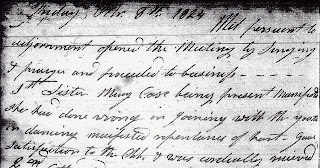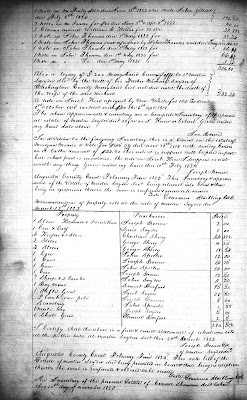Dancing
and socializing on an autumn day with friends sounds pleasant. Not quite for
Great Grandmother Mary. Here’s the story.
My
3rd Great Grandmother Mary A. (Case) Peck was born Jan. 23, 1800 in
Norwich, New London Co., Connecticut. Mary was the fourth child of Asahel Case
and Rosanna Sloan.
It’s
likely the Case family attended the First Baptist Church in Norwich since two
daughters were baptized into the congregation. Great Grandmother Mary was
baptized when she was 17 years old on Nov. 12, 1817. Eleanor Case, Mary’s older
sister, was baptized the same year. Baptists generally didn’t believe in Sunday
school or baptizing infants. They felt it was the parents’ responsibility to
teach their children the Christian faith. On her baptism day, Mary was immersed
in water according to First Baptist traditions.
Church
meetings began with singing and prayer. I can’t say if this was the case with
Great Grandmother’s church but some Baptist churches wouldn’t allow musical
instruments at their services.
Apparently,
the Baptists frowned on dancing. At an unknown locale in the fall of 1824 Mary
enjoyed a little dancing with the young people. You know how word gets around;
someone told the Church Elders. At the Oct. 5, 1824 church meeting, the fifth
order of business directed Elder Palmer to call on Mary Case.
Three
days later, Friday, Oct. 8, 1824, Sister Mary Case appeared at the meeting
house and admitted “she has done wrong” and appeared contrite. Afterward she was warmly accepted by the
church community.
Image from
Connecticut State Library Microfilm Collection
Friday,
Octr. 8th 1824
Met pursuant to
adjornment
opened the Meeting by Singing
&
prayer and proceeded to business - - - - -
1st
Sister Mary Case being present manifested
She had done
wrong in joining with the youts
in dancing
manifested repentanes of past Gave
Satisfaction to
the Chh. & was cordially received
You
can read more about Mary Case’s married life at blog post Bester B. Peck, Husband and Father, 1798-1863.
Sources:
Vital Records of Norwich 1659-1848, pub.
Hartford; Society of Colonial Wars in the State of Connecticut; 1913, Part II,
Page 628
First Baptist Church Records, Norwich,
Connecticut, 1800-1889, Microfilm Reel #64, 65, LDS #0005066 housed at the
Connecticut State Library, Hartford, Connecticut
My
Ancestry
3rd
Great Grandmother Mary A. Case and husband Bester B. Peck
2nd
Great Grandmother Mary M. Peck and husband Walter S. Wilson
Great
Grandfather Jerome W. Wilson and wife Grace Lee Clark
Grandmother
Viola L. Wilson and husband Frank Leroy Doty
My
Mother
Myself
Anton Romako's
Watercolor, 1889
Courtesy Wikimedia
Commons





